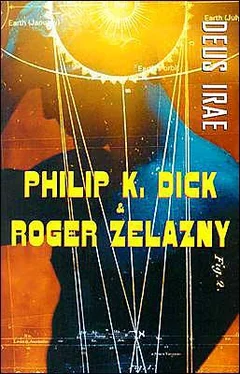This was not his first encounter with runners. Back in Charlottesville, runners came and went unmolested. Wherever runners could be found, a kind of peace prevailed, an idiomatic tranquility, engendered by the benign habits of the runners themselves.
The good-natured little faces peered up at Tibor. The creatures were not over four feet high. Fat and round, covered with thick pelts… beady eyes, quivering noses—and great kangaroo legs.
Amazing, these swift evolutionary entelechies, cast forth from what were essentially poisons. So many and so fast; so many immediate kinds. Nature, striving to overcome the filth of the war: the toxins.
“Clearness be with you,” the runners said, virtually in unison. Their whiskers twitched. “How come you don’t have any arms or legs? You’re very strange as a life-form.”
“The war,” Tibor said vaguely, resenting the pushiness of the runners.
“Did you know your cart is malfunctioning?” the runners asked.
“No,” he said, taken by surprise. “Doesn’t it run? It got me this far; I mean—” Panic flew up inside him.
“There is an autofac near here that still works a little,” the largest of the runners said. “It can’t do very much—not like it could in olden tunes. But it could probably replace the wheel bearings in your cart that are running dry. And the cost is not all that great.”
“Oh yes,” Tiber said. “The wheel bearings. They probably are running dry.” He lifted one wheel off the ground and spun it noisily. “You’re right,” he admitted. “Where’s the autofac?”
“A few miles north of here,” the smallest of the runners said. “Follow me.” The other runners scampered into a group that eased itself off. “Or rather,” the runner amended, “follow us. Hey, are you guys coming along, too?”
“Sure,” the body of runners said, whiskers twitching. They obviously did not want to miss out on any of the action.
To Potter and Jackson, Tibor said, “Can I trust them?” He held in his mind, at this moment, a nebulous fear: Suppose the runners led him off to some desolate region, then killed him and stole his cart? It seemed a distinct possibility, the times being what they were.
Potter said, “You can trust them. They’re harmless. Which is more than you can say for these damn bugs.” He kicked at a cluster of bugs; they scuttled away, avoiding his scaly foot.
“An autofac, an autofac,” the runners chanted happily as they raced off. Tibor cautiously followed. “We’re going to the autofac and get the limbless man a cheap repair. It’s guaranteed for a thousand years or a million miles; whichever comes first.” Giggling to themselves, the runners disappeared for a moment, then reappeared, beckoning Tibor genially on.
“Catch you coming back,” Jackson yelled after Tibor. “Make sure you get a written guarantee, just to be safe.”
“You mean,” Tibor said, “that I can expect tarrididdle from an autofac?” It must be a Russian one, he thought. The Russian autofacs were Byzantine in their convolutions of intellect. They seemed for the most part to be excellently built, however. If this one still functioned at all, it could undoubtedly repair his dry-running wheel bearings.
He wondered how much it would charge.
They reached the autofac at dawn. Brilliantly colored clouds, like the fingerpaintings of a baby, stretched across the sky. Birds or quasi-birds chirped in the weedy bushes growing on all sides of the runners’ fire-path.
“It’s around here somewhere,” Earl, the leader of the runners, said as he halted; his name, stitched in red thread on the bosom of his worksuit, declared itself to Tibor. “Wait; let me think.” He pondered at length.
“How about a bite to eat?” a runner asked Earl.
“We can get something from the autofac,” Earl said, nodding his shaggy head wisely. “Come on, inc.” He jerked an abrupt arm motion at Tibor. During the night, the click-clacking of the dry wheel bearings had become hideously loud; the assembly would not function much longer. “We make a right turn here,” Earl said, advancing toward a yarrow thicket, “then a sharp left.” Only his tail could be seen as he struggled into the stiff brush of the thicket. “Here’s the entrance!” he called presently, and waved Tibor to follow him.
“Will it cost very much?” Tibor said apprehensively.
“Won’t cost,” Earl said, thrashing about in the shrubbery a short distance ahead of Tibor. “Nobody comes this way anymore; it’s perishing. It’ll be glad to see us. These things, they have emotions, too. Of sorts.”
An opening appeared ahead of Tibor as he floundered about in his unwieldy cart. A weedless place, as free of grass as if it had been shaved. In the center of the open place he could make out a flat, large disc, evidently metal; clamped shut, it greeted him soundlessly, confronting him with its meaningful presence. Yes, he thought, it’s a Russian autofac that landed here in seed form from an orbiting satellite. Probably in the last days of the war, during which the enemy tried everything.
“Hi,” he said to the autofac.
A shiver passed through the runners. “Don’t talk to it like that,” Earl said, nervously. “Have more respect; this thing can kill us all.”
“Greetings,” Tibor said.
“If you’re pompous or boorish,” Earl said quietly, “it’ll kill us.” His tone was patient. As if, Tibor thought, he’s addressing a child. And perhaps that is what I am, vis-a-vis this construct: a baby who knows no better. This thing, after all, is no natural mutant. It was made.
“My friend,” Tibor said to the autofac. “Can you help me?”
Earl groaned.
“You call it, then,” Tibor said to him, feeling irritated. How many verbal rituals had to surround the summoning of the intelligence of this wartime human construct? Evidently a very large number. “Look,” he said to Earl, and also to the autofac, “I need its help but I’m not going to fall in a groveling heap and pray it to install new wheel bearings in my cart. It’s not worth it.” The hell with it, he thought. These are the entities which brought our race down; these did us in.
“Mighty autofac,” Earl said sonorously. “We pray for your good assistance. This wretched armless/legless man cannot complete his journey without your beneficent assistance. Could you take a moment to examine his vehicle? The right front wheel bearings have failed him in his hour of need.” He paused, listening intently, his doglike head cocked.
“Here it comes,” the smallest of the runners said in a rapt, appreciative tone of voice; he seemed awed.
The lid of the autofac slid back. A lift from beneath the entrance thrust up a tall metal stalk, on the end of which a bullhorn could be seen. The bullhorn swiveled, then lined itself up so that it directly faced Tibor.
“You are pregnant, are you?” the bullhorn brayed. “I can supply you with ancient cures: arsenic, iron rust, water in which the dead have been immersed, mule’s kidneys, the froth from the mouth of a camel—which do you prefer?”
“No,” Earl said. “He’s not pregnant. He has a wheel bearing that’s running dry. Try to pay attention, sir.”
“I’ll not be talked to like that,” the autofac said. A second rod jutted up, now. It appeared to have a gas nozzle mounted at ground level. “You must die,” the autofac said, and emitted several meager puffs of gray smoke. The runners retreated. “I require great amounts of freczibble…” The dour sounds emitted by the autofac faded into an indistinct mass of noise; something in the speech circuit had failed to function. The two vertical rods whipped back and forth in agitation, emitted a little more gas, harmlessly, then became inert. A curl of black Smoke ascended from the entranceway of the autofac, then a whine. Of gear teeth, Tibor decided.
Читать дальше








